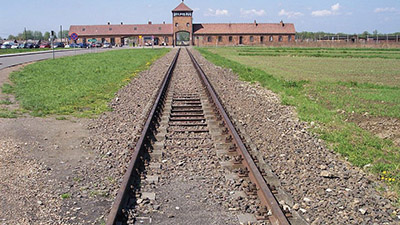
The diplomatic dispute between Poland and Israel over pending Polish legislation that would outlaw blaming Poland or Polish people for the crimes of the Holocaust has led to an outbreak of anti-Semitic backlash in Poland, including comments in the government-controlled media.
The goal is to criminalize reference to the concentration camps in Poland during Nazi occupation as “Polish death camps.”
Poland’s lower house of parliament on Friday approved the bill, which calls for penalties of up to three years in prison for anyone who “publicly and against the facts” accuses the Polish people of crimes committed by Nazi Germany during World War II. Poland’s ruling Law and Justice party says the law is meant to fight the common use of expressions including but not limited to “Polish death camps” to refer to the wartime camps that Nazi Germany operated in occupied Poland. It was alleged that Poles consider that they themselves were victims; that Poles were among those imprisoned, tortured and killed in the camps. The legislation grew out of the sense that Poles are being unfairly depicted as perpetrators of the Holocaust.
There has also been an eruption of anti-Israel and anti-Jewish comments online and in the media, including in state media, which is tightly controlled by the right-wing Law and Justice party.
Marcin Wolski, director of the state-run television station TVP 2, even went so far as to say Monday on air that the Nazi death camps should actually be called “Jewish death camps.”
“Who managed the crematoria there?” he asked, referring to the fact that prisoners, usually Jews, were forced to help dispose of gas chamber victims.
Wolski was joined on his show by a right-wing commentator Rafal Ziemkiewicz, who only a day earlier on Twitter had used an extremely derogatory term to refer to Jews. The comment was later removed.
On another talk show on Polish state TV on Saturday, anti-Semitic messages posted by viewers on Twitter were shown at the bottom of the screen, as one participant said a Jewish guest was “not really Polish.” The state TV director later apologized for the messages, blaming a technical glitch that caused them to appear on the screen unedited.
However, some commentators in Poland expressed dismay, saying the outbreak reminded them of the official state-sponsored anti-Semitic campaign carried out by Communist authorities in 1968.
“There has been a lot of hate speech against refugees and Muslims over the past two years in state media, but anti-Semitism was so far rare,” said Rafal Pankowski, who monitors anti-Semitism and other forms of extremism as head of the Never Again association.
“But in the last couple of days it seems the floodgates have opened,” he said.
Prime Minister Benjamin Netanyahu and Polish Prime Minister Mateusz Morawiecki agreed after speaking by phone Sunday night to try to resolve differences over the legislation by convening a group of history experts, though it was unclear how effective that will be given the strong support for the bill by the ruling Law and Justice party.
Before World War II, Jews had lived in Poland for centuries, thriving in some eras and even becoming the world’s largest Jewish population. But anti-Semitism in the decades before the war had grown virulent, driving many Polish Jews to emigrate.
The Israeli government has supported the campaign against the phrase “Polish death camps,” but it has strongly criticized the new legislation, which still must be approved by the Senate and by President Andrzej Duda, who both support it.
Israel, along with several international Holocaust organizations and many critics in Poland, argues that the law could have a chilling effect on debating history, harming freedom of expression and leading to a whitewashing of Poland’s wartime history, which also includes episodes of Poles killing Jews or denouncing them to the Germans.
Polish Holocaust and World War II scholars, as well as international organizations including Yad Vashem, the U.S. Holocaust Memorial Museum and the Wiesenthal Center, are among those who have criticized the law. Critics say they fear the law could lead to self-censorship in academia and that the legislation – which also mentions “other crimes against peace and humanity” – is so broad that it could be used to fight any form of criticism against Poland by authorities already accused of eroding democratic standards.
In a sign of the sensitivities on both sides, Yesh Atid leader Yair Lapid insisted in a heated Twitter exchange with the Polish Embassy that “there were Polish death camps and no law can ever change that.”
By Israel Hayom Staff and combined sources
Israeli journalist Lahav Harkov wrote a tweet that consisted only of the phrase “Polish death camps” repeated 14 times.













